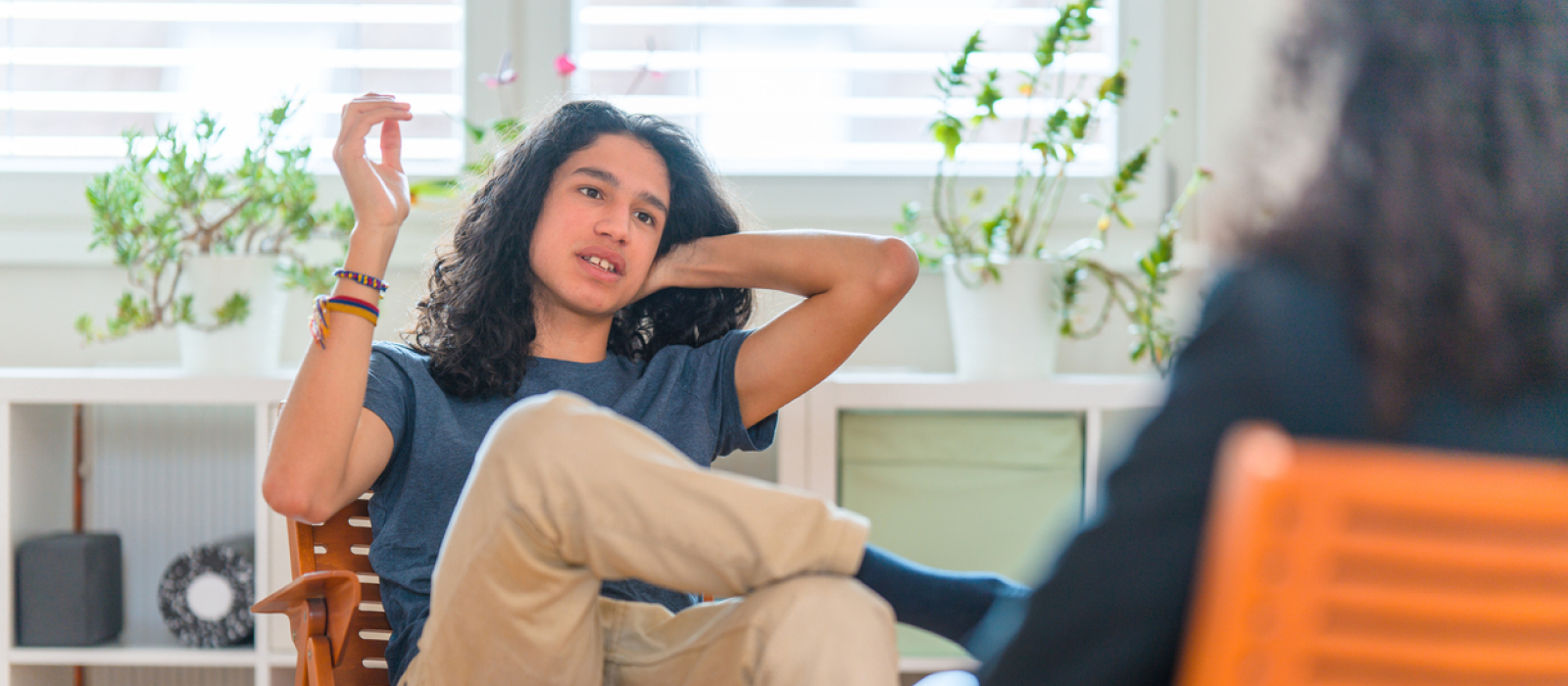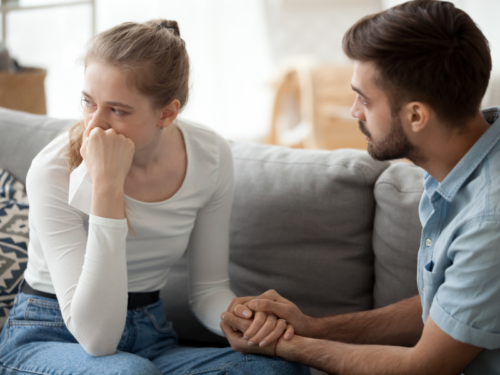
Table of Contents
What Separation Anxiety in Relationships Looks Like (and How to Cope)

Written By: Sarah Fielding

Clinically Reviewed By: Dr. Don Gasparini
November 17, 2023
6 min.
Separation anxiety is more than just missing someone—the anxiety disorder can leave you unsure and worried about a relationship. Keep reading to learn tips for how to deal.
Learn more about our Clinical Review Process
Table of Contents
It’s common for people to say the expression, “I have separation anxiety,” to emphasize how much they miss someone when they’re apart. But clinically speaking, separation anxiety, defined as a severe state of fear, worry, or stress about being apart from a person or the state of the relationship itself, is actually a type of anxiety disorder. Keep reading to learn more about the causes and symptoms of separation anxiety and therapist-recommended tips for coping with separation anxiety in relationships.

Healing from separation anxiety is possible
Charlie Health offers virtual, personalized anxiety treatment from home.
What is separation anxiety in relationships?
Mental health professionals historically thought of separation anxiety disorder as a condition in children, but people of all ages can experience it. Adult separation anxiety can come up in romantic, platonic, and familial relationships. “Whether it’s a child with a mother, or two best friends, or a romantic relationship between lovers, separation anxiety brings with it that same terror of being apart, a terror manifesting as an intense desire to always stay together,” says licensed professional counselor, Dr. Carl Nassar, CIIPTS.
Common signs of separation anxiety in a relationship include:
- Feeling excessive fear or worry when the other person is gone
- Catastrophizing or obsessing over being left or something terrible happening to the other person
- Requiring constant reassurance
- Jealousy when not included in a plan
- Panic attacks
While many separation anxiety symptoms mirror those of other anxiety disorders, licensed marriage and family therapist Saba Harouni Lurie explains that the source of the anxieties is different. With separation anxiety in a romantic relationship, you may feel worries about a loss of intimacy or fear of abandonment by your romantic partner. In a platonic relationship, it might manifest as worry about being left out. “Given the importance of social connections and attachment, it makes sense that we may feel anxious if we perceive a threat to a meaningful connection,” she adds.
The causes of separation anxiety in relationships
A range of experiences and even predispositions can cause you to experience separation anxiety in a relationship. Understanding where your emotions stem from can be an essential step in working through the mental health condition. Here are some common causes of separation anxiety in relationships:
Adverse childhood experiences
Your early experiences can profoundly impact how you move through and interact with others in the world. They can set the benchmark in your head of what it feels like to be in a relationship of any kind and how much you can rely on other people. If you experience separation anxiety, “much of the time it comes from relational wounds, often early relational wounds experienced in childhood,” says Nassar. These wounds, clinically known as adverse childhood experiences (ACEs), range in severity and impact but can include parental divorce, bullying, the death of a close family member, and abuse. These experiences can also lead to a range of anxiety disorders like panic disorder or social anxiety disorder.
An anxious attachment style
There are four attachment styles: secure, anxious, avoidant, and dismissive (the last one being a mixture of the former two). “If you developed an anxious attachment style in early childhood or at any stage of your development, you may experience separation anxiety in your relationships in adulthood,” says Lurie. The aforementioned ACEs can cause an anxious attachment style and bring fear or anxiety symptoms in your relationship.

Betrayal in a relationship
Being let down or forgotten sucks, and it’s not something that’s easy to forget. Lurie says this kind of relationship betrayal can also set the tone for your fears and expectations in future relationships. You might find yourself waiting for the other shoe to drop or seeking regular reassurance to assuage your fears.
Genetics
Mental health professionals and researchers widely believe anxiety disorders to be, at least in part, genetic. You’re more likely to experience separation anxiety if your family has a history of anxiety disorders.
Coping with separation anxiety in relationships
It’s unlikely you’ll never have a moment of doubt or feel disconnected in a relationship. But these emotions don’t have to overwhelm you and hold the power to skew your perception of a relationship and the other person as an individual. Here are some steps you can take to cope with separation anxiety in relationships:
Admit your feelings
You can’t start addressing separation anxiety if you don’t acknowledge that you’re experiencing it. As you do this, though, make sure that you’re not looking down on yourself for feeling this way. “Find ways to treat yourself with compassion,” says Lurie. “No one is served by you being unkind to yourself about how you feel, and acknowledging your emotions is the first step towards managing them.”
Treat yourself with compassion
Anyone who has experienced poor mental health knows how easy it is to fall into feelings of panic or frustration when they arise. Instead, do your best to feel compassion for yourself and those parts of you that care so much about you being alright. Kindly talk yourself through what’s brought up these feelings and, whenever possible, present countering examples. For example, Lurie explains that if you’re feeling anxious that a friend doesn’t like you because they don’t return your call, remind yourself of all the times they have shown up in your life. Nassar suggests telling yourself something like: “The people in my life aren’t going anywhere. They love me. This is about time for me away from them and time for them away from me. We’ll be together again soon enough.”
Redefine your alone time
On that note, you might be so focused on relationship anxiety about the other person that you automatically view any alone time with a negative lens. “People with separation anxiety struggle to tell the difference between loneliness, the experience of believing there’s no one here to love you, and of being alone, the experience of solitude that can arrive with time to rest and rejuvenate,” says Nassar. Think about ways you can care for yourself and recharge in moments of alone time, too.
Remember that some separation is good. “In healthy relationships, each person spends some time going out into the world on their own, enjoying a rich and diverse set of experiences, and then excitedly bringing all this back to the relationship,” adds Nassar. “In this way, each person brings the relationship to life with their individual sense of aliveness.”
Explore healthy coping mechanisms
Finding activities or habits that soothe you can be beneficial for managing separation anxiety and your overall well-being. Think of what calms you—or what you’ve always wanted to try—and go for it. This might be pottery, joining a dance class, or whatever non-toxic activity calls to you.

Explore the why (with professional support)
What is the root of separation anxiety for you? This question may be challenging to answer and require discussions with loved ones or a therapist, but it can unlock so much of what’s bothering you. Understanding the cause, especially in conversations with a mental health professional skilled in treating anxiety, can allow you to work on those specific triggers and limit their impact on you.
How Charlie Health can help with separation anxiety
If you’re dealing with separation anxiety with a family member, friend, or romantic partner, Charlie Health is here to help.
As mentioned, working with a mental health professional might be necessary in some cases of separation anxiety disorder. Charlie Health’s virtual Intensive Outpatient Program (IOP) offers more than once-weekly therapy for teens and adults with serious mental health conditions.
For those with separation anxiety, our expert clinicians can teach coping strategies in individual counseling, group sessions, and family therapy. One technique that might be explored is cognitive behavioral therapy (CBT), an effective treatment option for online therapy that helps you explore and reframe negative thoughts (including those about relationships).
Fill out this short assessment to see if Charlie Health is right for you.




